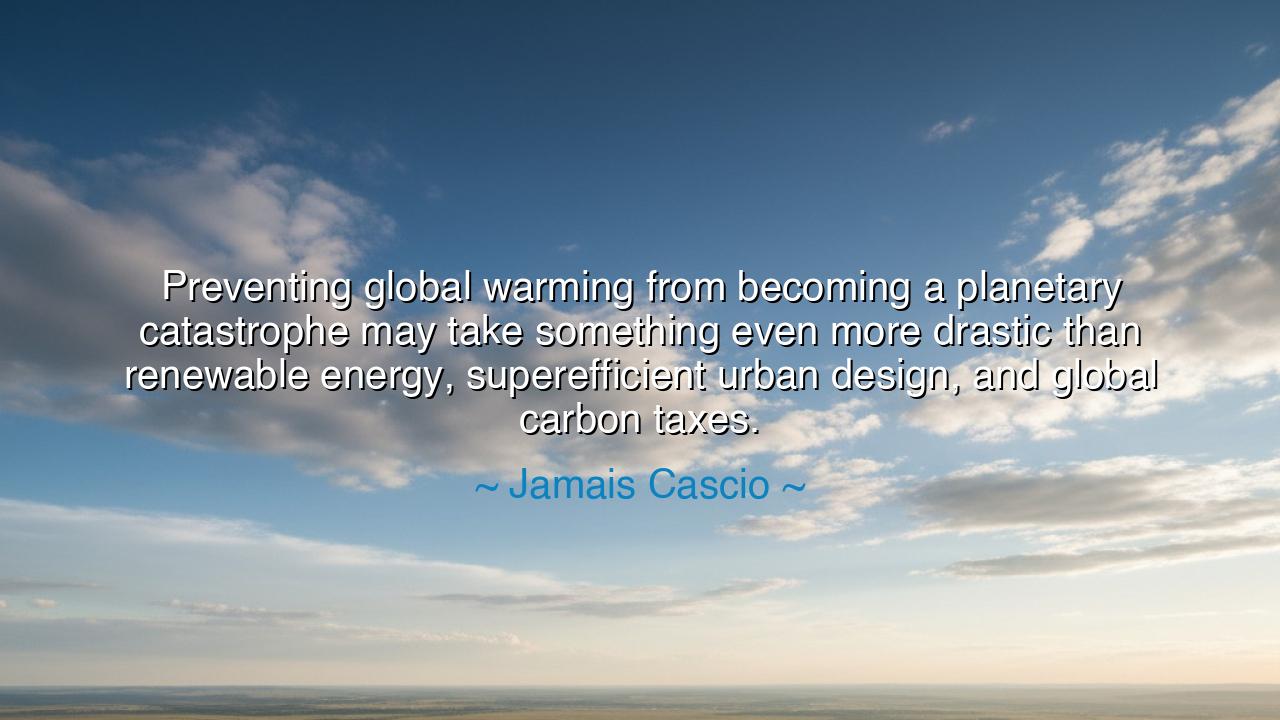
Preventing global warming from becoming a planetary catastrophe
Preventing global warming from becoming a planetary catastrophe may take something even more drastic than renewable energy, superefficient urban design, and global carbon taxes.






“Preventing global warming from becoming a planetary catastrophe may take something even more drastic than renewable energy, superefficient urban design, and global carbon taxes.” Thus spoke Jamais Cascio, a seer of the modern age — one who gazes not into the past, but into the trembling horizon of what may yet come. His words, both prophetic and somber, summon us to face the great reckoning of our time: that the Earth, our cradle and our mirror, groans beneath the weight of human ambition. Cascio warns us that the struggle for survival will not be won by half-measures or comfort-born reforms. The battle to save our planet demands not only invention, but transformation — a reawakening of the human spirit itself.
For what he speaks of — global warming — is not merely a change of temperature. It is the slow unraveling of balance, the fever of a world long abused by its stewards. Since the dawn of the industrial age, mankind has kindled fires that burn not only in engines and factories, but in the skies and seas. The carbon we have exhaled into the heavens now circles us like a curse of our own making. And though we forge renewable energy, design our cities with care, and impose carbon taxes in repentance, Cascio reminds us that these alone may not suffice. For we fight not against mere numbers, but against our own nature — the endless hunger for growth without harmony, for power without restraint.
This is the tragedy of our age: that we have learned to shape the atom and split the stars, yet struggle still to live gently upon the Earth. The drastic measures Cascio speaks of are not only technological — they are spiritual. They call for a new covenant between humanity and nature, one forged not in dominance, but in reverence. For centuries, the ancients understood what we have forgotten: that to take without giving is to invite ruin. The Egyptians built temples aligned with the stars to honor the order of the cosmos; the Taoists of China spoke of the balance of all things, knowing that when one force grows unchecked, destruction follows. Today, we must remember their wisdom if we are to survive our own brilliance.
Consider the story of the Dust Bowl in the 1930s — a wound carved by human hand upon the American plains. Farmers, seeking profit, stripped the land of its grass and balance, and the soil rose in storms that darkened the sun. Millions fled their homes. Yet from this disaster was born a new understanding — that the land must be respected, its cycles restored. Conservation and stewardship took root from the ashes of arrogance. So too, Cascio calls us to a greater reckoning — not of one region, but of the whole Earth. The lesson of the Dust Bowl must now be the lesson of civilization itself.
What, then, are these drastic actions Cascio envisions? Perhaps he speaks of geoengineering, of altering the very sky to shield the Earth from its own heat. Or perhaps he means something deeper still — a change in consciousness, a revolution of empathy. For even if technology saves our atmosphere, only wisdom can save our souls. The true battle is not against carbon, but against complacency. We must learn again to see the sacred in the soil, to count not in profits but in generations, to build not for luxury but for life.
And so, the message of Cascio’s words echoes through time: that salvation will not come from invention alone. The machine, though powerful, must be guided by the mind, and the mind must be guided by the heart. The ancients built monuments to the gods; we must build our monuments to the living Earth — in the forests we protect, in the waters we cleanse, in the children we teach to love the world that sustains them. For no tax, no law, no device will save us if the human soul remains estranged from nature.
Therefore, my child, take this teaching to heart: live as though the future depends upon you — for it does. Do not wait for nations or heroes to act; begin where you stand. Plant a tree, speak truth, waste nothing, and let your life become a quiet rebellion against indifference. The catastrophe Cascio warns of is not inevitable, but neither is it far. Yet in every generation, there are those who rise to meet the shadow with light. Be among them. Let your choices be your offering to the world. For when humanity remembers its place not as conqueror, but as guardian, then — and only then — may hope once again take root in the soil of the Earth.






AAdministratorAdministrator
Welcome, honored guests. Please leave a comment, we will respond soon